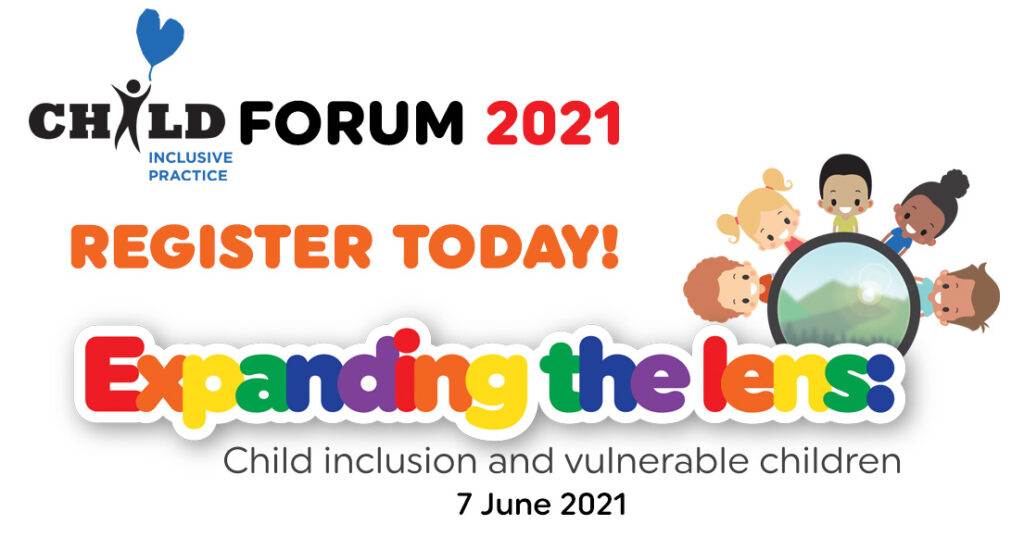
No. 8, 2021 | 4 June 2021
Go to:
From FRSA's Executive Director
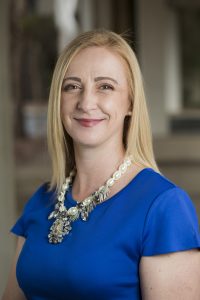
As reconciliation week draws to a close, I reflect on the generosity, strength and compassion that Aboriginal and Torres Strait Islander Australians bring to the process of reconciliation. There is much to celebrate on this long, slow journey but still so much that speaks to the injustices – and the enduring effects of these injustices – on the lives of our First Nations peoples. Yesterday the Australian Institute of Health and Welfare (AIHW) released a report that shows that the Stolen Generations aged 50 and over are more likely to be worse off than other Indigenous Australians of the same age on a range of health and socioeconomic outcomes. The picture is even more dire when outcomes for Stolen Generations aged 50 and over are compared with non-Indigenous Australians. And, of course, the intergenerational impacts of forced removal reverberate in our communities. Aboriginal and Torres Strait Islander children continue to be over-represented in out of home care (more on this below) and as discussed in an earlier edition of this eBulletin, Indigenous Australians continue to be incarcerated at staggering rates.
On 26 May 2021, the Uluru Statement from the Heart, which was endorsed by First Nations peoples four years ago, was announced as the winner of the 2021 Sydney Peace Prize (Australia’s only international prize for peace). What fitting recognition of a process that brought Australia’s First Nations people together to agree a pathway for healing and peace. I took the time to revisit the Uluru Statement from the Heart, and its invitation from First Nations people to “walk with us in a movement of the Australian people for a better future”.
Here at the FRSA office, excitement builds as Monday 7 June and our first fully online event – the Child Inclusive Practice Forum 2021 – rapidly approaches. Expanding the lens: Child inclusion and vulnerable children gives us the chance to think how children’s lives intersect with decision making situations, when families can be quite lost and to hear children’s decisions when their voice can be lost. With a strong line up of speakers, it is promising to be a fantastic day!
Lastly, but no less importantly, my thoughts are with our colleagues and friends in Melbourne – and with the children and families they work with – as they face another challenging lockdown situation. Stay safe Victoria.
Kind regards,
Jackie Brady
FRSA Executive Director
Anglicare's Life After Lockdown report
 Anglicare Sydney has released their Life After Lockdown report which highlights the impact of COVID-19 on people experiencing financial disadvantage, mental health issues and social isolation.
Anglicare Sydney has released their Life After Lockdown report which highlights the impact of COVID-19 on people experiencing financial disadvantage, mental health issues and social isolation.
The report shows evidence of a social recession and an increase in financial hardship in the aftermath of COVID-19. Key highlights include the increasing demand on services as government supports are withdrawn, the rise in the number of people needing support in the private rental market and the financial impact on younger people aged 18-34 years. Additionally, their clients have reported increasing levels of stress and anxiety as a result of the pandemic along with social isolation as some vulnerable people have become more and more disconnected from family and friends.
Connection to family, friends and community report
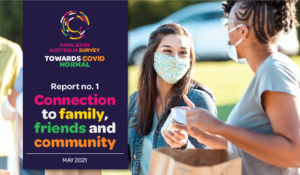 The Australian Institute of Family Studies has released findings from the latest Families in Australia Survey: Report no. 1: Towards COVID Normal, Connection to family, friends and community. The report looked at connection with others – from family members living elsewhere to the local community.
The Australian Institute of Family Studies has released findings from the latest Families in Australia Survey: Report no. 1: Towards COVID Normal, Connection to family, friends and community. The report looked at connection with others – from family members living elsewhere to the local community.
According to the survey 30% of respondents admitted they had ‘too little’ contact with their family, with a lack of free time, distance and COVID restrictions cited as the most common reasons.
AIHW report released – Child protection Australia 2019–20
A new report from the Australian Institute of Health and Welfare (AIHW), shows that the rate of children living in out-of-home care has remained relatively steady for the past four years.
The report, Child protection Australia 2019–20, shows as at 30 June 2020, there were around 46,000 children in out-of-home care across Australia. The report found that:
- Most of the children in out-of-home care (94%) were on a care and protection order and 67% had been continuously in out-of-home care for 2 years or more.
- Almost one-third (32%) of children in out-of-home care were aged 10‒14, and a similar percentage were aged 5‒9 (30%).
- One in 32 children aged 0–17 received child protection services in 2019–20.
- Indigenous children continue to be overrepresented with 1 in 6 Indigenous children receiving child protection services.
- Indigenous children were in out-of-home care as at 30 June 2020, 11 times the rate for non-Indigenous children.
More information about the report is available on the AIHW website.
Last days to register for online Child Inclusive Practice Forum 2021!
Only a few more days until the Child Inclusive Practice Forum on Monday, 7 June. We’re very excited to bring the sector together online for this event. The day will kick off with a panel discussion on “What the Pandemic has taught us about the needs of children: Implications for policy and practice” facilitated by Professor Jennifer McIntosh AM with panellists:
- National Children’s Commissioner, Anne Hollonds,
- CEO of the Australian Childhood Foundation, Dr Joe Tucci
- Manager of Aboriginal Services at Centacare Catholic Family Services, John Lochowiak
And we’ll end with a Keynote address from Professor Jenn McIntosh titled, “Child Inclusion: When nothing else would work”.
Delegates will also have the opportunity to join live Q&A sessions with our concurrent session presenters. If you can’t make it on the day you can still register and gain access to the on-demand library for up to 60 days post-Forum.
| Registration Categories | Fees |
| FRSA Member | $95 |
| Non-FRSA Member | $150 |
Forum registration includes streaming access to:
- The Keynote address/es
- All concurrent presentations
- A panel discussion
- The opportunity to participate in the live Q&A with speakers
Access to the on-demand library for up to 60 days post forum.
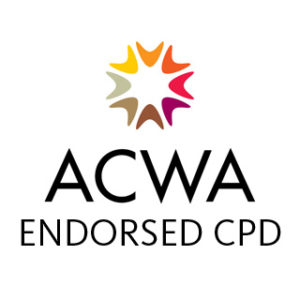 This year’s CIP Forum is an Australian Community Workers Association endorsed CPD event. All registrants of the event will be eligible for seven Continuing Professional Development hours/points for their participation.
This year’s CIP Forum is an Australian Community Workers Association endorsed CPD event. All registrants of the event will be eligible for seven Continuing Professional Development hours/points for their participation.
CIP FORUM GOLD AND PANEL SPONSOR - Children Beyond Dispute
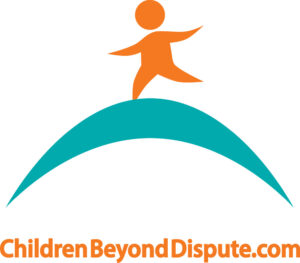
International and cross-cultural suitability of child inclusive mediation practice and training
The full report, including a downloadable PDF copy of the following mentioned report is available for download here.
Child Inclusive Mediation & Counselling (CIMC) is a powerful, evidence-based intervention for enabling parents in dispute to align their perspectives around a shared view of their children’s developmental and emotional needs from a post-separation parenting plan.
CIMC was developed by Professor Jennifer McIntosh AM, a leading child psychologist in the divorce and family trauma fields, and tested in comparison trial, and followed up over four years (McIntosh, Wells, Smyth & Long 2008).
Initially, all training was in-person, but since 2014, online formats of the 4-day program have been available as self-paced modules, and are widely used through Australia, New Zealand and the Asia-Pacific regions. Since its inception, more than 2000 practitioners have trained in the CIMC method.
In late 2020, ChildrenBeyondDispute.com sought to explore the cultural and legislative applicability of the child inclusive method and its online training formats. Expressions of interest were sought through international networks for experienced dispute resolution practitioners to complete and provide detailed feedback on the current online CIMC training formats.
This brief report outlines the findings from 27 participants from 15 countries. Implications for both the method of child inclusion and its training formats are discussed.
You can also find out more about CIMC at www.childrenbeyonddispute.com.

Improving the visibility of superannuation assets in family law proceedings
On 31 May 2021, the Morrison Government released exposure draft legislation that will make it easier to identify superannuation assets in family law proceedings.
The draft legislation provides for a party to family law property proceedings in the Family Court of Australia, Federal Circuit Court of Australia and Family Court of Western Australia to apply to the court to request their former partner’s superannuation information from the ATO. The Bill will also authorise the ATO to disclose superannuation information to court registry staff for the purpose of use by the parties for relevant family law proceedings.
Release of the Bill has been welcomed by women’s legal services and the super industry, who see the legislation as a move towards women getting their fair share of super after a relationship ends and, in particular, preventing family violence perpetrators from hiding their superannuation assets when they are going through the family law courts.
Government is seeking feedback on the Bill. The draft legislation and supporting materials are available on the Treasury website. Consultation will close on 28 June 2021.
Consultation on a New Decision-Making Framework for Family Law Property Matters
The Attorney-General’s Department consultation on a new decision-making framework for property matters in family law is underway.
Submissions close on 9 July 2021. For more information visit the Attorney-General’s Department website.
Developing the next National Plan to Reduce Violence against Women and their Children
The public consultation on the next National Plan to reduce family, domestic and sexual violence is open. You can have your say here. The consultation closes 11:59pm, Saturday 31 July 2021.
Implementing the successor plan to the National Framework – Discussion paper
The Australian Government through the Department of Social Services has just opened consultation on implementing the successor plan to the National Framework for Protecting Australia’s Children 2009-2020.
The Australian Government is developing a successor plan to the National Framework for Protecting Australia’s Children 2009-2020 (successor plan), in collaboration with state and territory governments.
The successor plan is due to be finalised in July 2021, and the department is seeking feedback on how it can ensure the successor plan’s first five-year implementation plan can create real change.
A discussion paper has been released, which is informed by findings from the 2019-2020 national consultations led by Families Australia. Submissions are due by 5.00pm, 26 July 2021.
Review of direct cross-examination ban – FRSA submission lodged
FRSA has lodged a submission the government’s review of amendments to the Family Law Act 1975 to ban direct cross-examination in family law matters involving domestic violence.
The ban aims to prevent the re-traumatisation of victims of family violence through direct cross-examination. The ban also seeks to ensure that victims are not deterred from participating in legal proceedings.
Mr Robert Cornall AO and Ms Kerrie-Anne Luscombe are conducting the review and will report to government by August 2021. Submissions have now closed.
For more information about the review visit the Attorney-General’s Department website.

FRSA Members celebrate National Reconciliation Week
It was National Reconciliation Week this week from 27 May to 3 June.
This year’s theme, More than a word. Reconciliation takes action, urges the reconciliation movement towards braver and more impactful action. FRSA members celebrated throughout the week with a range of activities. Including:
- Centacare Catholic Family Services’ Mobile Family Connections team joined more than 250 people at Neporendi Aboriginal Forum Inc., Old Reynella, on Tuesday for a southern reconciliation celebration. Meanwhile, Children’s Services staff at Seaton have used calico squares to create a wall hanging reflecting the colours and landscapes that bring us together. Staff were also led by Aboriginal Services Manager, John Lochowiak on the Adelaide Kaurna Walking Trail to see the city in a different light.
- For Reconciliation Week, local agencies in Esperance including Centrecare, have come up with a pledge banner that is being passed around town, that people can sign.
- Anglicare NSW South, NSW West & ACT shared artwork from the children at their Early Learning service Goulburn Family Day Care.
- Centacare Brisbane celebrated with a range of guests including Uncle Robbie who performed a smoking ceremony, local artist Shara Delaney and Toni Janke, Centacare Manager of Culture and Inclusion, who hosted a Black Trivia session.
- Anglicare Southern Queensland ran National Reconciliation Week painting workshops for their staff and their Cultural Support Worker, Lalania made a video about a few different types of Bush Tucker.
- YFS held a yarning circle with local Elders.
- CatholicCare Social Services Hunter-Manning’s Aboriginal Cultural Planner, David Dryden did an interview with mnews.today on how we can each play our part in achieving reconciliation in Australia.
- Anglicare Sydney‘s Newmarch House hosted Gandangarra local Aboriginal Land Council member, Wilma Hogan, to speak with residents and staff.
- Baptist Care SA staff attended a National Reconciliation Week Breakfast hosted by Reconciliation South Australia.
Click the images to find out more.

Innovation, good practice and change in the Domestic and Family Violence Sector following COVID-19
 UNSW researchers invite practitioners, managers and others to share examples of innovation, change or good practice in supporting people affected by domestic and family violence in the context of COVID-19. The information will help to build knowledge about how the pandemic has led to new ways of working, what has worked well, and what will be sustained. Information about the study is available here. The survey takes 15 minutes or less to complete and closes Friday, 25 June.
UNSW researchers invite practitioners, managers and others to share examples of innovation, change or good practice in supporting people affected by domestic and family violence in the context of COVID-19. The information will help to build knowledge about how the pandemic has led to new ways of working, what has worked well, and what will be sustained. Information about the study is available here. The survey takes 15 minutes or less to complete and closes Friday, 25 June.
Families in Australia Survey

Everyone is part of a family whether by birth or choice. Twice a year the Australian Institute of Family Studies looks at what is happening for families and the latest survey is now open. How are you and your family going as you travel the ups and downs of family life? Complete the survey and tell your story of relationships, and the care you give and receive and how you juggle family life with other commitments. Because families are who we look to for support every day, AIFS is calling on every Australian to share their experience in the Families in Australia Survey.
The 20-minute survey helps paint a picture of what life is like for families across the length and breadth of Australia. Telling your stories will help inform government and service providers on how families are faring in Australia.
As a thank you, participants in the survey can opt-in to a random draw for one of five $500 shopping vouchers.
Complete the survey today or share throughout your networks.
Effective Online Group Leadership Workshop
SUNSHINE CIRCLES – Albury
SUNSHINE CIRCLES – Shepparton
EOFY offer for all your child safeguarding needs
Child Wise has you covered on all things child safeguarding in a way that’s tailored to your specific needs, from conducting a child safeguarding review, to providing targeted training for your staff, board and volunteers. Book and pay by June 30 and have their services delivered by 17 December, 2021. Terms and conditions apply. Speak to their staff today at 1300 244 539 or email info@childwise.org.au
VIC
Family Dispute Resolution Practitioner | Relationships Australia Victoria
NSW
Mental Health Clinician – headspace Batemans Bay | Relationships Australia Canberra & Region
Fundraising Specialist – Major Gifts and Corporate Partnerships | BaptistCare NSW & ACT

Shocks and safety nets? Financial wellbeing during COVID-19 | Brotherhood of St Laurence
 This paper explores the impacts of the COVID-19 crisis and resulting policy responses on financial wellbeing.
This paper explores the impacts of the COVID-19 crisis and resulting policy responses on financial wellbeing.
Preventing the financial abuse of women: literature and desktop review | Department of the Prime Minister and Cabinet
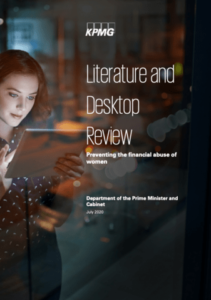 This document presents a review of the literature relating to existing approaches to addressing financial abuse of women. It explores how the issue of financial abuse is defined and discussed, maps a variety of interventions and programs in place to which respond, and prevent the issue from occurring, and looks at how best practice can be defined.
This document presents a review of the literature relating to existing approaches to addressing financial abuse of women. It explores how the issue of financial abuse is defined and discussed, maps a variety of interventions and programs in place to which respond, and prevent the issue from occurring, and looks at how best practice can be defined.
Honouring Aboriginal and Torres Strait Islander voices in healing family violence | Emerging Minds
This framework by Dana Shen, Rosie Schellen and Dan Moss aims to assist practitioners in mainstream services to develop their confidence in asking child-focused, culturally-sensitive questions in their role in providing safety for children whose parents experience family violence.
Children’s experiences of family violence | Emerging Minds
This fact sheet adapted from Tucci et. al. provides information about the effects of family violence on a child’s social and emotional wellbeing, and ways that interventions can play a role in healing.
The digital lives of younger Australians | Australian Communications and Media Authority
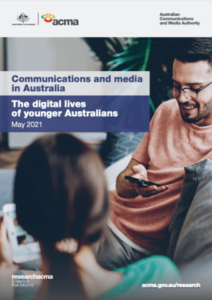 This report provides a snapshot of the attitudes and behaviours of younger people online, the extent and nature of their online habits, what they use to stay connected, and how they feel about the prominence of digital connection in their lives.
This report provides a snapshot of the attitudes and behaviours of younger people online, the extent and nature of their online habits, what they use to stay connected, and how they feel about the prominence of digital connection in their lives.
Aboriginal and Torres Strait Islander Stolen Generations aged 50 and over: updated analyses for 2018–19 | Australian Institute of Health and Welfare
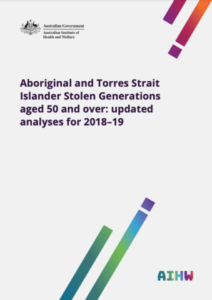 In 2018–19 there were an estimated 27,200 surviving Aboriginal and Torres Strait Islander people aged 50 and over who had been removed from their families and communities as a result of past government policies. The findings of this report show that the Stolen Generations aged 50 and over are more likely to be worse off than other Indigenous Australians of the same age on a range of health and socioeconomic outcomes.
In 2018–19 there were an estimated 27,200 surviving Aboriginal and Torres Strait Islander people aged 50 and over who had been removed from their families and communities as a result of past government policies. The findings of this report show that the Stolen Generations aged 50 and over are more likely to be worse off than other Indigenous Australians of the same age on a range of health and socioeconomic outcomes.
Review of Fetal Alcohol Spectrum Disorder (FASD) among Aboriginal and Torres Strait Islander people | Alcohol and Other Drugs Knowledge Centre
The review states that FASD is a preventable, lifelong disability. FASD disproportionately affects Aboriginal and Torres Strait Islander people, however, there are limited prevalence statistics available in the mainstream Aboriginal and Torres Strait Islander population. Accompanying the review is a short video of key points from the review, a summary version of the review with infographics and a factsheet.
The 15 practices of rural community co-produced mental health initiatives: advice from people who are doing them | Social Innovation Research Institute (SUT)
 This paper highlights key advice about things to do and things to think about when establishing and operating rural community co-produced initiatives for local mental health and wellbeing services.
This paper highlights key advice about things to do and things to think about when establishing and operating rural community co-produced initiatives for local mental health and wellbeing services.
Health justice partnership as a response to domestic and family violence | Health Justice Australia
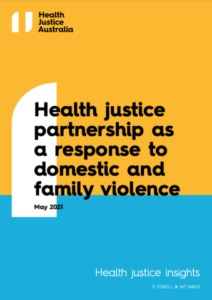 This paper describes health justice partnership as an integrated response to domestic and family violence – what partnerships currently look like, where they are found, who they support, and what they offer partner agencies, practitioners and their clients.
This paper describes health justice partnership as an integrated response to domestic and family violence – what partnerships currently look like, where they are found, who they support, and what they offer partner agencies, practitioners and their clients.
Telepractice resources | Parenting Research Centre
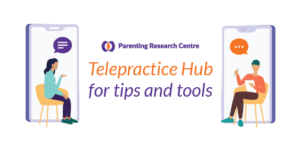 The Parenting Research Centre has updated their Telepractice Hub with new guides and resources, including a quiz to test your Telepractice knowledge. The Hub is designed to assist organisations and practitioners to identify why, how and when to use digital and online delivery within a continuum of supports for parents.
The Parenting Research Centre has updated their Telepractice Hub with new guides and resources, including a quiz to test your Telepractice knowledge. The Hub is designed to assist organisations and practitioners to identify why, how and when to use digital and online delivery within a continuum of supports for parents.
CSnet Impact Report 2020 | CSnet
Queensland University of Technology (QUT) conducted independent research to measure the ‘before and after’ impact of the implementation of CSnet.
Want to submit something to the FRSA eBulletin?
If you have an news item or event that you would like to be featured in a future eBulletin please submit your announcement via the form below or email communications@frsa.org.au with the subject “FRSA eBulletin submission”.
Please note FRSA members receive priority for items posted in the eBulletin. And to keep information current, relevant and useful, submissions will not be repeated from week to week.
Subscribe
Subscribe to receive future eBulletin editions directly to your inbox!




